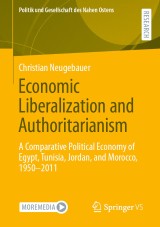Details

Economic Liberalization and Authoritarianism
A Comparative Political Economy of Egypt, Tunisia, Jordan, and Morocco, 1950-2011Politik und Gesellschaft des Nahen Ostens
|
96,29 € |
|
| Verlag: | VS Verlag |
| Format: | |
| Veröffentl.: | 29.11.2021 |
| ISBN/EAN: | 9783658356392 |
| Sprache: | englisch |
| Anzahl Seiten: | 653 |
Dieses eBook enthält ein Wasserzeichen.
Beschreibungen
<p>Contrary to other world regions, political regimes in the Middle East and North Africa (MENA) remain largely authoritarian. While the search for explanations is still ongoing, Christian Neugebauer draws attention to a hitherto underresearched factor: economic liberalization. Being part of a global shift from state-led development towards structural adjustment in the economy, these policies also deeply affected the countries of the MENA region. This makes the resilience of authoritarianism in the region all the more puzzling, as a large part of the scientific community expected economic liberalization to undermine authoritarian regimes. Neugebauer strives to solve the puzzle with a comparative case study that covers four countries (Egypt, Tunisia, Jordan, and Morocco) and their political regimes, from independence in the 1950s to the Arab Spring in 2011. He shows that two specific policies of economic liberalization might in fact have been relevant for regime stability: consumer-price liberalization and privatization.</p><p></p><p> </p><p> </p><p><br></p>
Introduction.- Key terms.- Theory and state of the art.- Theoretical model and hypotheses.- Epistemology, methodology, methods.- Empirical analysis—Economic liberalization and the stability of authoritarian regimes in resource-poor countries of the MENA region: Egypt, Tunisia, Jordan, and Morocco,1950–2011.- Conclusion
<b>Christian Neugebauer</b> was a PhD candidate and lecturer in political economy of the Middle East and North Africa at the Center for Near and Middle Eastern Studies (CNMS), University of Marburg, Germany. He currently works as a regional expert (Middle East, North Africa, and Turkey) for an institution of the private economy.
<div><p>Contrary to other world regions, political regimes in the Middle East and North Africa (MENA) remain largely authoritarian. While the search for explanations is still ongoing, Christian Neugebauer draws attention to a hitherto underresearched factor: economic liberalization. Being part of a global shift from state-led development towards structural adjustment in the economy, these policies also deeply affected the countries of the MENA region. This makes the resilience of authoritarianism in the region all the more puzzling, as a large part of the scientific community expected economic liberalization to undermine authoritarian regimes. Neugebauer strives to solve the puzzle with a comparative case study that covers four countries (Egypt, Tunisia, Jordan, and Morocco) and their political regimes, from independence in the 1950s to the Arab Spring in 2011. He shows that two specific policies of economic liberalization might in fact have been relevant for regime stability: consumer-price liberalization and privatization.</p><p></p><p></p><p><b>About the author</b></p></div><div> <p><b>Christian Neugebauer</b> was a PhD candidate and lecturer in political economy of the Middle East and North Africa at the Center for Near and Middle Eastern Studies (CNMS), University of Marburg, Germany. He currently works as a regional expert (Middle East, North Africa, and Turkey) for an institution of the private economy.</p><p><b> </b></p></div>

















